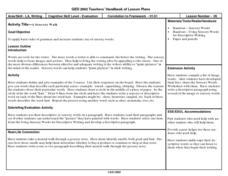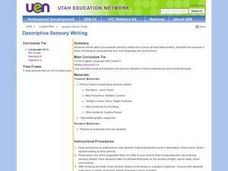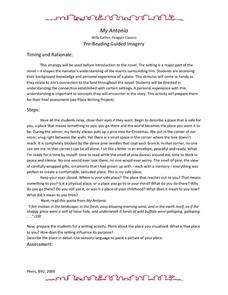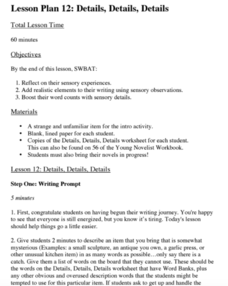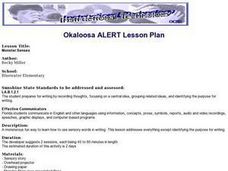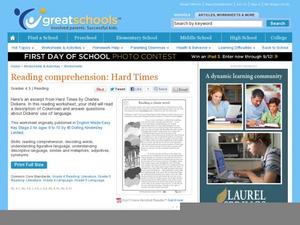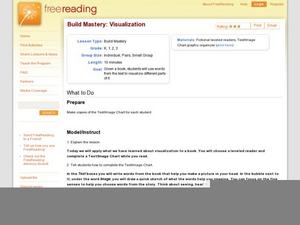Curated OER
"Snapshot" Exercises & Sensory Detail Word Bank
Read a sample of creative descriptive writing to your science class. Discuss how writing can be used to record and communicate observations that scientists make. Reading selections and thought-provoking questions are suggested. Also...
Roald Dahl
Charlie and the Chocolate Factory
You can't read Roald Dahl's Charlie and the Chocolate Factory without craving the rich treats described in Dahl's vivid prose. Young writers try their hands at sensory language with a lesson plan that prompts them to write about their...
Curated OER
Let's Go Exploring!
Use a Courbet painting of a cave or tunnel opening to reinforce the importance of descriptive writing. Writers of all ages use sensory details to describe what the scene depicts as they pretend to be in the painting. Then they imagine...
Curated OER
Setting Worksheet
Set your class up for success with writing descriptive settings with these two graphic organizers. On the first page, writers note specifc details about their chosen setting and comment on how each character views the setting. The second...
Curated OER
A Sensory Walk
Students define and give examples of five senses, compiling a list of sensory words to be used in a written descriptive paragraph.
Curated OER
Go Free or Die
Groups of older elementary learners begin their study of figurative language by visiting a website and completing the exercises detailed there. They then apply what they have learned by finding examples in several poems. Finally, they...
Brigham Young University
Out of the Dust: Guided Imagery
A guided imagery exercise is a great way to get readers thinking about writing. As part of their study of Out of the Dust, Karen Hesse’s 1998 Newbery Medal winning verse novel, class members listen to a reading of one of the poems from...
Curated OER
Three Skeleton Key: Elements of Literature
Rats! How are they described in "Three Skeleton Key," and what happens to the characters in the story? Study the vocabulary and the story with these worksheets. Learners complete pre-reading activities, study vocabulary, complete...
School District No. 71
Adding Written Detail: Using Jane Yolen’s Owl Moon as a Mentor Text
Access your senses with a worksheet on sensory language. Based on Owl Moon by Jane Yolen, the worksheet prompts kids to find examples of each of the five senses, as well as phrases for inner emotion.
Curated OER
Visualization: Cricket in Times Square
After reading The Cricket in Times Square chapter titled "Caught in the Kitchen," learners list three describing details about the characters and setting. Groups collaborate to find sensory details to support their character assertions....
Curated OER
Descriptive Prompt: Precise Language
Incorporate sensory details into a piece of descriptive writing. First, elementary and middle schoolers improve a piece of writing by using precise, vivid language, as well as appropriate word choice. They then listen to a variety of...
Poetry4kids
Evoking the Senses in a Poem
Budding poets choose a topic for a sensory-filled poem. Authors describe that topic using detailed language based on the five senses. Then, switch the senses to create a fanciful poem intended to add a touch of fun to the objective.
T. Smith Publishing
Your Five Senses
Using the five senses is a creative way to write descriptively. Learners read 25 words, both nouns and verbs, and place them into the category labeled with the correct sense.
August House
The Stolen Smell
Some smells are better than others! Explore your sense of smell with a series of activities based on the Peruvian folktale, The Stolen Smell. With exercises about phonics, counting, cooking, art, and drama, the lesson is a well-rounded...
Curated OER
My Antonia: Prereading Guided Imagery
What makes a place safe? What makes a setting effective? Explore the safe spaces and descriptive language with a prereading activity for Willa Cather's My Antonia. The teacher describes his or her own safe space and then prompts pupils...
Curated OER
Reading Examples
Young writers read excerpts from Gary Paulsen's memoir to identify figurative and literal language that contain sensory details. They determine which selections are examples of sensory language and fi the language is used literally or...
Curated OER
Details, Details, Details
Writing can become one-dimensional if authors don't involve all their senses. First, scholars observe a strange object which, ideally, they can touch and even smell. Without using certain words (you can create a list or have the class...
Curated OER
Monster Senses
Second graders listen to a story that contains many sensory words to describe an object. They listen a second time using a signal to indicate when they hear a sensory word. They write a short story about a monster using appropriate...
K20 LEARN
Sweet and Savory Writing: Descriptive Writing
The engagement is in the details. Young scholars learn the benefit of weaving descriptive and sensory details into the fabric of their writing through the activities in this lesson. As their hands explore items concealed in bags, a...
Curated OER
Sensory Visualization chart
In this sensory visualization worksheet, students are provided with spaces to record their senses after a teacher has given them a visual prompt.
Curated OER
Reading a Classic Novel
Charles Dickens offers an excellent example of sensory writing in this reading comprehension worksheet. Learners read excerpts from the novel Hard Times in which he describes the New England industrial city of Coketown. They consider why...
Curated OER
Build Mastery: Visualization
What do you see? Young reader tap into the visualization process as they listen to or read a fiction story and fill out a graphic organizer. Model this first with a think-aloud, showing scholars how you visualize a familiar story. For...
Hachette Children’s Group
Our Five Senses
Show your class how to experience their world with the five sense. With worksheets on each sense, learners investigate their surroundings and categorize them into sight, smell, touch, hearing, and taste.
Curated OER
A Creative Presentation
Bring writing to life with this lesson in which elementary and middle schoolers create a display of the imagery they identify in a series of Gary Paulsen books. They read the suggested materials, identify imagery and descriptive...






